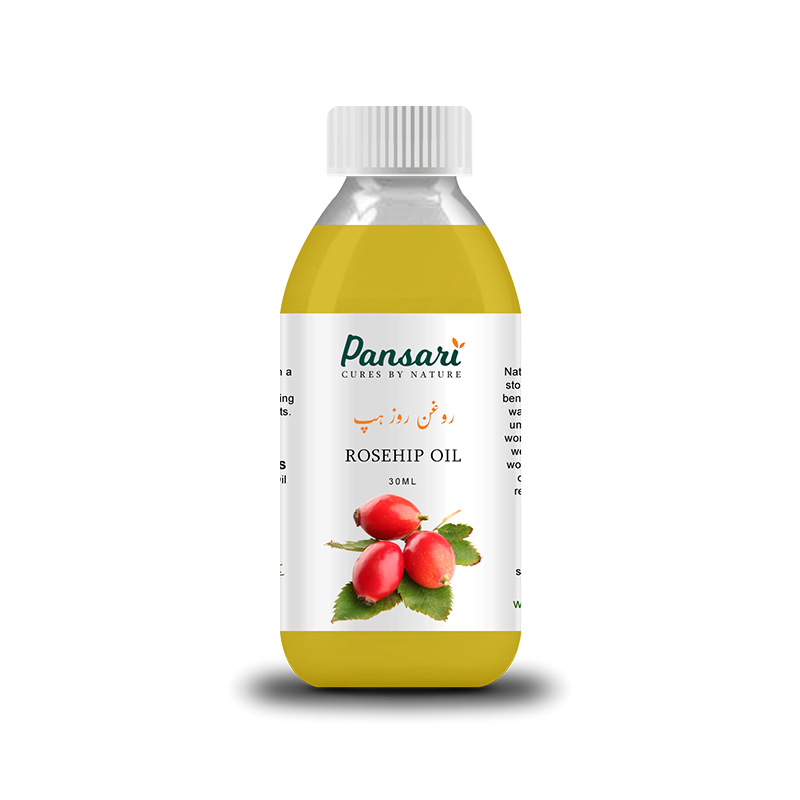
03-111-965-965
0332-1309589


Rosehip oil is also known as rosehip seed oil or the “Oil of Youth”, is running a close race with coconut oil when it comes to its benefits for the skin. Rosehips were a remedy used by the ancient Egyptians, Mayans and Native Americans all because of their amazing healing properties. It’s derived from the rosa canina rose bush, which is grown mostly in Chile.
Rosehip oil is loaded with skin-nourishing vitamins and essential fatty acids. It also contains phenols that have been shown to have antiviral, antibacterial, and antifungal properties. Rosehip oil is often used as a carrier oil for essential oils which are too intense to put on your skin directly.
It is also one of the richest plant sources of vitamin C which is another reason why rosehip oil is such a great choice for the skin and more.
Benefits Of Rosehip Oil:
1. Anti Aging Properties:
Rosehip oil has significant anti-aging benefits for your face. Super light and non-greasy, the anti-aging benefit comes from its high antioxidant content and the oil’s ability to penetrate into deeper layers of the skin where it can improve moisture levels and reduce visible signs of aging.
2. Protection From Age Spots:
The UV rays of the sun can damage the skin, resulting in age spots and hyperpigmentation on the face. The antioxidants found in rosehip oil, especially the combination of vitamin C and vitamin E, can help to combat free radicals that cause sun damage. These antioxidants can actually reduce the overproduction of pigment in skin, which is exactly what leads to uneven tone and age spots in the first place.
The oil of rose hips is also deeply moisturizing and aids in removing redness and irritation. These properties also make rosehip oil a possible treatment for rosacea.
3. Helps With Stretch Marks And Reduces Scarring:
The essential fatty acids found in rosehip oil can help get rid of scars and reduce the appearance of stretch marks by promoting skin regeneration. When applied topically, the essential fatty acids act as emollients helping to soften the skin while also increasing hydration.
Rosehip oil may also help with cases of eczema thanks to its emollient status which means it can provide a protective barrier to the skin while also smoothing out flakiness. The oil can also help to reduce dry scalp and itchiness that are often caused by chemicals in most store-bought shampoos.
Chemical Constituents Of Rosehip Oil:
The main chemical constituents of Rosehip Oil are: Linoleic Acid, Alpha-Linolenic Acid, Oleic Acid, Palmitic Acid, and Stearic Acid.
Linoleic Acid (OMEGA 6) are known to:
Moisturize hair and promote its growth
Facilitate wound healing
Be an effective emulsifier in the formulation of soaps and quick-drying oils
Exhibit anti-inflammatory properties
Soothe acne and reduce chances of future outbreaks
Promote moisture retention in skin and hair
Make oils feel thinner in consistency when used in an oil blend, thus being beneficial for use on acne-prone skin
Alpha-Linolenic Acid (OMEGA-3) is known to:
Lessen inflammation
Control blood clotting on the skin
Soothe joint pain and ease stiffness to improve flexibility
Oleic Acid (OMEGA 9) are known to:
Maintain the softness, suppleness, and radiance of skin and hair
Stimulate the growth of thicker, longer, and stronger hair
Reduce the appearance of aging, such as premature wrinkles and fine lines
Eliminate dandruff and thereby support hair growth
Boost immunity
Exhibit antioxidant properties
Prevent joint inflammation, stiffness, and pain
Palmitic Acid is known to:
Have emollient properties
Soften hair without leaving a greasy or sticky residue
Be the most common saturated fatty acid
Stearic Acid is known to:
Have cleansing properties that purge dirt, sweat, and excess sebum from hair and skin
Be an ideal emulsifying agent that binds water and oil
Help products remain potent when stored for long periods of time
Condition and protect hair from damage without diminishing luster or making it feel heavy
Have exceptional cleansing properties
Soften skin
Used topically, Rosehip Oil is suitable for all skin types, including skin that is sensitive, dry, oily, scarred, or damaged by UV radiation. Skin types that are oily or acne-prone will benefit more from using it sparingly, as it may aggravate such skin conditions.
How To Use Rosehip Oil?
1. For Acne & Stretch Marks:
To 1 tablespoon of rosehip oil, add 1 tablespoon of jojoba oil and 1 tablespoon of lavender oil. Mix well and pour it into a small glass bottle.
Apply 2 to 3 drops daily at night and massage into the skin.
2. For Wrinkles:
Clean and exfoliate your skin.
Apply a drop of Rosehip oil into your clean index finger
Gently pat the rosehip oil into your eyes, forehead (anywhere you have wrinkles)
3. For Scars:
Clean and exfoliate your skin
Apply a drop of Rosehip oil into your clean index finger
Simply massage a few drops into acne scars or damaged areas.
4. For Hair:
Warm up some rosehip oil and massage it into hair.
Wait 30 minutes before washing with regular shampoo.
5. For Face & Neck:
Clean and exfoliate your skin
Simply get 3 drops on your palm, rub your palms together
Deeply massage your face & neck using upward motions.
The information is for educational purposes only. This information has not been evaluated by the Food and Drug Administration.
This information is not intended to diagnose, treat, cure, or prevent any disease.